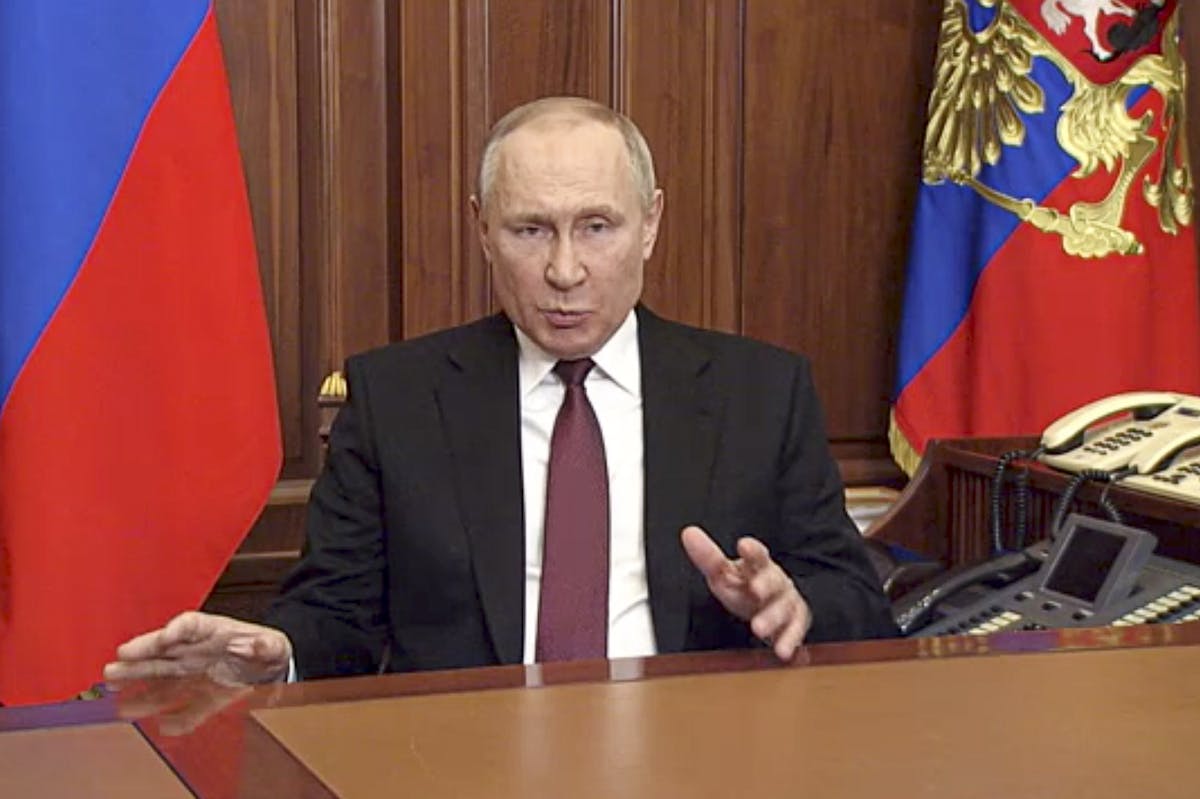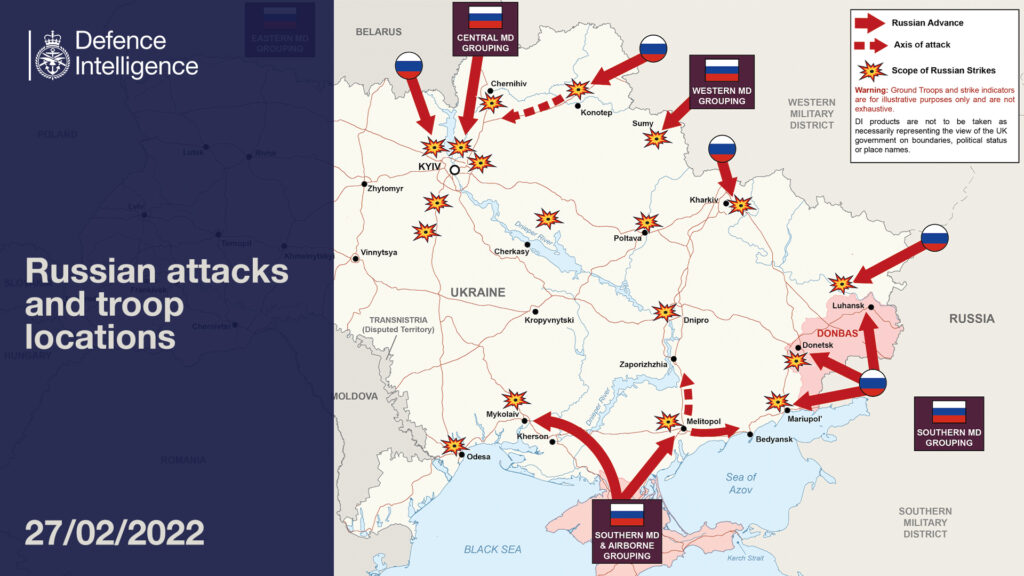Putin Orders High Alert for Russia’s Nuclear Forces as Ukrainians Pressed in Ports, Cities
The order raised the threat that the tensions with the West over the invasion in Ukraine could lead to the use of nuclear weapons.

KYIV, Ukraine (AP) — President Vladimir Putin has ordered Russian nuclear deterrent forces put on high alert amid tensions with the West over his invasion of Ukraine.
Speaking at a meeting with his top officials, Mr. Putin asserted on Sunday that leading NATO powers had made “aggressive statements” along with the West imposing hard-hitting financial sanctions against Russia, including the president himself.
Mr. Putin ordered the Russian defense minister and the chief of the military’s General Staff to put the nuclear deterrent forces in a “special regime of combat duty.”
His order raised the threat that the tensions with the West over the invasion in Ukraine could lead to the use of nuclear weapons.
The Russian leader this week threatened to retaliate harshly against any nations that intervened directly in the conflict in Ukraine.
Mr. Putin’s nuclear order came as street fighting broke out in Ukraine’s second-largest city and Russian troops squeezed strategic ports in the country’s south Sunday, advances that appeared to mark a new phase of Russia’s invasion following a wave of attacks on airfields and fuel facilities elsewhere in the country.

The capital, Kyiv, was eerily quiet after huge explosions lit up the morning sky and authorities reported blasts at one of the airports. Only an occasional car appeared on a deserted main boulevard as a strict 39-hour curfew kept people off the streets. Terrified residents instead hunkered down in homes, underground garages and subway stations in anticipation of a full-scale Russian assault.
“The past night was tough – more shelling, more bombing of residential areas and civilian infrastructure,” President Volodymyr Zelensky said. “There is not a single facility in the country that the occupiers wouldn’t consider as admissible targets.”
Following its gains to the east in the city of Kharkiv and multiple ports, Russia sent a delegation to Belarus for peace talks with Ukraine, according to the Kremlin. Zelensky suggested other locations, saying his country was unwilling to meet in Belarus because it served as a staging ground for the invasion.
Until Sunday, Russia’s troops had remained on the outskirts of Kharkiv, a city of 1.4 million about 12.4 miles south of the border with Russia, while other forces rolled past to press the offensive deeper into Ukraine.
Videos posted on Ukrainian media and social networks showed Russian vehicles moving across Kharkiv and Russian troops roaming the city in small groups. One showed Ukrainian troops firing at the Russians and damaged Russian light utility vehicles abandoned nearby.
The images underscored the determined resistance Russian troops face while attempting to enter Ukraine’s bigger cities. Ukrainians have volunteered en masse to help defend the capital, Kyiv, and other cities, taking guns distributed by authorities and preparing firebombs to fight Russian forces.
Ukraine’s government also is releasing prisoners with military experience who want to fight for the country, a prosecutor’s office official, Andriy Sinyuk, told the Hromadske TV channel Sunday. He did not specify whether the move applied to prisoners convicted of all levels of crimes.
Russian President Vladimir Putin hasn’t disclosed his ultimate plans, but Western officials believe he is determined to overthrow Ukraine’s government and replace it with a regime of his own, redrawing the map of Europe and reviving Moscow’s Cold War-era influence.
The pressure on strategic ports in the south of Ukraine appeared aimed at seizing control of the country’s coastline stretching from the border with Romania in the west to the border with Russia in the east. A Russian Defense Ministry spokesman, Major General Igor Konashenkov, said Russian forces had blocked the cities of Kherson on the Black Sea and the port of Berdyansk on the Azov Sea.
He said the Russian forces also took control of an airbase near Kherson and the Azov Sea city of Henichesk. Ukrainian authorities also have reported fighting near Odesa, Mykolaiv and other areas.
Cutting Ukraine’s access to its sea ports would deal a major blow to the country’s economy. It also could allow Moscow to build a land corridor to Crimea, which Moscow annexed in 2014 and until now was connected to Russia by a 12-mile bridge, the longest in Europe.
Flames billowed from an oil depot near an airbase in Vasylkiv, a city 23 miles south of Kyiv where there has been intense fighting, according to the mayor. Russian forces blew up a gas pipeline in Kharkiv, prompting the government to warn people to cover their windows with damp cloth or gauze as protection from smoke, the president’s office said.
Ukrainian military deputy commander Lieutenant General Yevhen Moisiuk sounded a defiant note in a message aimed at Russian troops.
“Unload your weapons, raise your hands so that our servicemen and civilians can understand that you have heard us. This is your ticket home,” General Moisiuk said in a Facebook video.
The number of casualties so far from Europe’s largest land conflict since World War II remains unclear amid the fog of combat.
Ukraine’s health minister reported Saturday that 198 people, including three children, had been killed and more than 1,000 others wounded. It was unclear whether those figures included both military and civilian casualties. Russia has not released any casualty information.
Ukraine’s U.N. ambassador, Sergiy Kyslytsya, tweeted Saturday that Ukraine appealed to the International Committee of the Red Cross “to facilitate repatriation of thousands of bodies of Russian soldiers.” An accompanying chart claimed 3,500 Russian troops have been killed.
ICRC’s permanent observer to the U.N., Laetitia Courtois, told The Associated Press that the situation in Ukraine was “a limitation for our teams on the ground” and “we therefore cannot confirm numbers or other details.”
The United Nations’ refugee agency said Sunday that about 368,000 Ukrainians have arrived in neighboring countries since the invasion started Thursday. The U.N. has estimated the conflict could produce as many as 4 million refugees, depending how long it continues.
Mr. Zelensky denounced Russia’s offensive as “state terrorism.” He said the attacks on Ukrainian cities should be investigated by an international war crimes tribunal and cost Russia its place as one of the five permanent members of the United Nations Security Council.
“Russia has taken the path of evil, and the world should come to depriving it of its U.N. Security Council seat,” he said.
Kremlin spokesman Dmitry Peskov said a Russian delegation of military officials and diplomats had arrived Sunday in the Belarusian city of Gomel for talks with Ukraine. Mr. Zelensky on Friday offered to negotiate a key Russian demand: abandoning ambitions of joining NATO.
Ukraine’s president said his country was ready for peace talks but not in Belarus.
“Warsaw, Bratislava, Budapest, Istanbul, Baku, we offered all of them to the Russian side and we will accept any other city in a country that hasn’t been used for launching missiles,” Mr. Zelensky said. “Only then the talks could be honest and put an end to the war.”
Mr. Peskov claimed Ukraine had proposed holding talks in Gomel. He added that the Russian military action was going forward pending the talks start.
An adviser to Mr. Zelensky, Mykhailo Podolyak, dismissed Moscow’s offer as “manipulation,” adding that Ukraine hadn’t agreed to talks in the Belarusian city.
As Russia pushes ahead with its offensive, the West is working to equip the outnumbered Ukrainian forces with weapons and ammunition while punishing Russia with far-reaching sanctions intended to further isolate Moscow.
The U.S. pledged an additional $350 million in military assistance to Ukraine, including anti-tank weapons, body armor and small arms. Germany said it would send missiles and anti-tank weapons to the besieged country and that it would close its airspace to Russian planes.
The United States, the European Union and United Kingdom agreed to block “selected” Russian banks from the SWIFT global financial messaging system, which moves money around more than 11,000 banks and other financial institutions worldwide, part of a new round of sanctions aiming to impose a severe cost on Moscow for the invasion. They also agreed to impose “restrictive measures” on Russia’s central bank.
Responding to a request from Ukraine’s minister of digital transformation, tech billionaire Elon Musk said on Twitter that his satellite-based internet system Starlink was now active in Ukraine and that there were “more terminals en route.”
Germany’s Chancellor, Olaf Scholz, meanwhile, said Sunday that his country is committing $112.7 billion to a special fund for its armed forces, raising its defense spending above 2% of gross domestic product. Mr. Scholz told a special session of the Bundestag the investment was needed “to protect our freedom and our democracy.”
